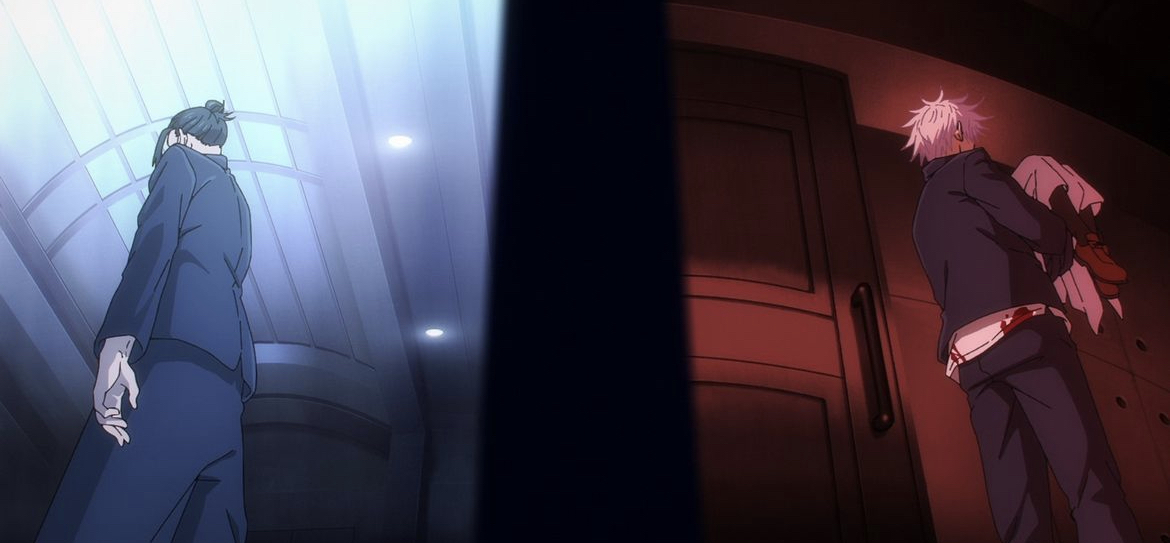As the second part of Jujutsu Kaisen Season 2 is well under way, with the highly anticipated “Shibuya Incident” Arc starting three weeks ago, let’s revisit the first part, which adapted “Hidden Inventory/Premature Death,” and dive into its themes of identity and isolation. Throughout the duration of these arcs, the author Gege Akutami uses Satoru Gojo and Suguru Geto to closely examine relationships and what they mean to us.
As humans, we are social creatures that benefit from having close relationships. For Gojo, whose very existence ‘shifted the balance of the world,’ he was always someone who would struggle with relating to people—thus creating his isolation. In meeting Geto, he was able to temporarily find someone who could stand beside him as “the strongest” students, and those three years of high school with Geto were the peak of his life. We see Gojo a few times remark things like ‘they picked us for this mission, because we’re the strongest’ or ‘don’t worry I’ll be fine, cause you’re here too.’
Although, the two had differing beliefs on what their powers should be used for, as Geto took a more righteous approach, preaching to his counterpart that the strong should protect the weak. While Gojo didn’t really care about being righteous nor protecting those weaker than him, they still understood each other deeply.
Unfortunately, this status quo changes when they come into contact with Toji Fushiguro, the man with a hidden inventory. In his rematch against Toji, Gojo reaches a state of enlightenment and unlocks the full extent of his powers. The author has him quote Buddha by stating ‘Throughout Heaven and Earth, I Alone am the Honored One’ arrogantly, but rightfully claiming his spot at the top of the Jujutsu world. Ultimately, this blessing of being the strongest would isolate him from everyone — including Geto, something he wouldn’t realize till much later.
After his fight with Toji, Geto was unable to find meaning in being a Jujutsu Sorcerer and continuing to protect the weak. He saw the ugliness of humans as they celebrated the death of Riko Amanai, a 14-year-old girl who he alongside Gojo failed to protect.
Thus, Suguru Geto’s mental decline started. He lost his identity, no longer being apart of the strongest. As a result of this, he went on missions alone, and was trapped in a never ending work-cycle of exorcising curses, and consuming them (his technique is curse manipulation, meaning he swallows curses in order to use them in battle) which led to him becoming more depressed. Unfortunately, Geto didn’t speak up about his struggles and Gojo was too busy honing his skills to see that his best friend wasn’t in the best head space.
Through speaking with Yuki Tsukumo, Geto had a dark thought that would later become the catalyst for the “Premature Death of his Virtuous Soul.” Due to curses being born from the negative emotions of humans, if one were to create a world with no more non-sorcerers (everyday people), then wouldn’t the problem of dealing with curses be solved?
However, it wasn’t until the death of his optimistic classmate, Yu Haibara, alongside seeing two little girls being tortured and blamed for a curse—who attacked their village on one of his missions—that Geto snapped. He killed everybody in the village, then later on, his own parents. He was done protecting the weak and instead was going to create a world of only Jujutsu Sorcerers — by eliminating the weak. This madness served as a form of enlightenment for him, as he no longer had to second guess his true hatred for humans.
Gojo is distraught in hearing all of this. His best friend who preached the righteous world view and served as his moral compass would never turn around and start killing humans, or so he thought. The sad part about this is that in isolation, Geto had become a completely different man than the one Gojo knew. In their final conversation of the arc finale, Gojo tells Geto that killing all humans is an insane plan that isn’t possible. Geto then criticizes him, asking why would he say it’s impossible when he himself has the strength to do so. This leads to the infamous quote, “Are you the strongest because you’re Satoru Gojo or are you Satoru Gojo because you’re the strongest?” In asking him this, Geto puts Gojo’s identity into question. Does your strength make you or do you make your strength?
Geto is now a branded criminal. As a Jujutsu sorcerer and the only person capable of killing him at that moment, it is Gojo’s duty to do so. However, he lets Geto leave unscathed, because although he could easily do so, he just can’t bring himself to kill his former best friend and the only person who ever understood him.
Gojo and Geto both interact with the theme of identity and isolation, and it has differing effects on both of them. Gojo was able to rise up to the heavens and evolve while Geto fell from grace into the darkness and spiraled. Through the passage of time, people’s experiences will inevitably change them which in turn changes their relationships with one another.












This is an amazing explanation from a amazing person